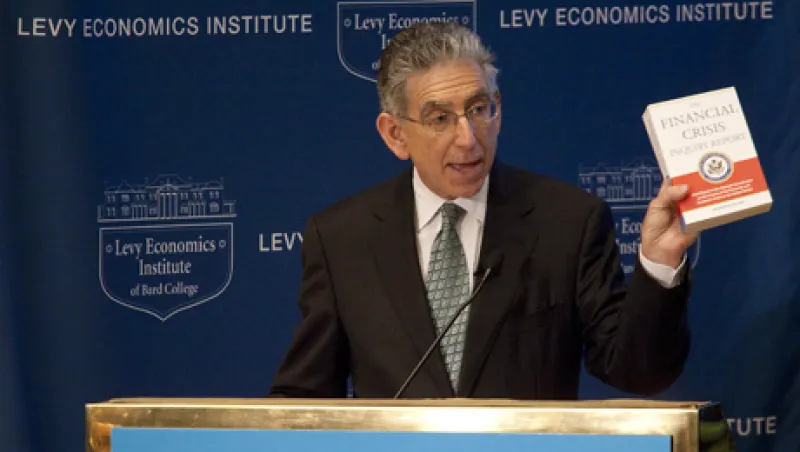Key elements of the $1 billion lawsuit by the U.S. Department of Justice against Bank of America, announced October 24th, seem ripped from pages of the 400-page Financial Crisis Inquiry Commission report. “Prosecutors have taken up the cudgel,” says FCIC chairman Phil Angelides.
Two years after the FCIC wrapped up an investigation of the 2008 financial collapse, its conclusions are finally reaching courtrooms in sweeping litigation, as Angelides had promised when the report was released in February 2011. “There were systematic failures — breaches of accountability in the purchasing, bundling and selling of mortgages around the world,” Angelides says. “It was not a one-off problem — not one transaction in breach of standards. It was pervasive.” A Countrywide mortgage origination program named “Hustle,” at the center of the new legal action, “speaks to the contempt with which fair dealing was held by those firms and their leaders,” Angelides says. By purchasing Countrywide, Bank of America inherited the liabilities in dispute.
“In total,” the FCIC report stated, “Freddie [Mac] reviewed $76.8 billion of loans and found $21.7 billion to be ineligible, meaning they did not meet representations and warranties.” Worse, Freddie reviewed less than 15 percent of all loans acquired or guaranteed from multiple sources, and Freddie was smaller than Fannie Mae. Conduct was “spectacularly brazen in scope,” Preet Bharara, New York U.S. attorney, has alleged. If successful, Bharara has said, the suit will restore to Fannie far more in damages than $1 billion at issue now. Dozens of lawsuits have targeted individual transactions. Recent prosecutions reflect a sea change. “People lying on mortgage applications didn’t cause the financial crisis,” Angelides says. “It was driven by financial firms.” Lest anyone forget, Angelides warns that failures did not occur only in isolated cases as some bankers would rather believe. “Firms were systematically selling mortgages that were clearly defective. They didn’t know or didn’t care to know about breaches in representations and warranties.”
Yes, the FCIC chairman concedes, wheels of justice have taken longer than expected to launch major prosecutions. Angelides makes no claim, however, that the FCIC report handed prosecutors all they needed. The FCIC pointed out violations of law, but more work remained to support guilty verdicts. Cases reflect exhaustive research and investigation beyond the scope and resources of the FCIC. “I don’t view it as our hard work alone,” Angelides says. “But in case after case, evidence comports with the pattern of conduct that the FCIC investigated and exposed.”
Besides Bank of America, a civil suit against J.P. Morgan and a lawsuit by the Federal Housing Finance Agency against more than a dozen institutions also reference the FCIC report. In building the case against vestiges of Bear Stearns filed by the President’s Working Group on Residential Mortgage Backed Securities, for instance, New York Attorney General Eric Schneiderman expressed “early and keen interest” in the FCIC report, says Angelides.
The Bear Stearns civil prosecution was a milestone, according to Angelides. “Some people have said, 'Well, gee, what’s new here?' What’s new is that for the first time,” Angelides says, “evidence put on the table by the FCIC and others was taken up by the government in a significant civil lawsuit.”
Angelides approves of the litigation, “not because we want heads on sticks but because we want justice done, wrongs righted and redress for those from whom money was taken.”
The author, S.L. Mintz, was on the FCIC report-writing staff.






